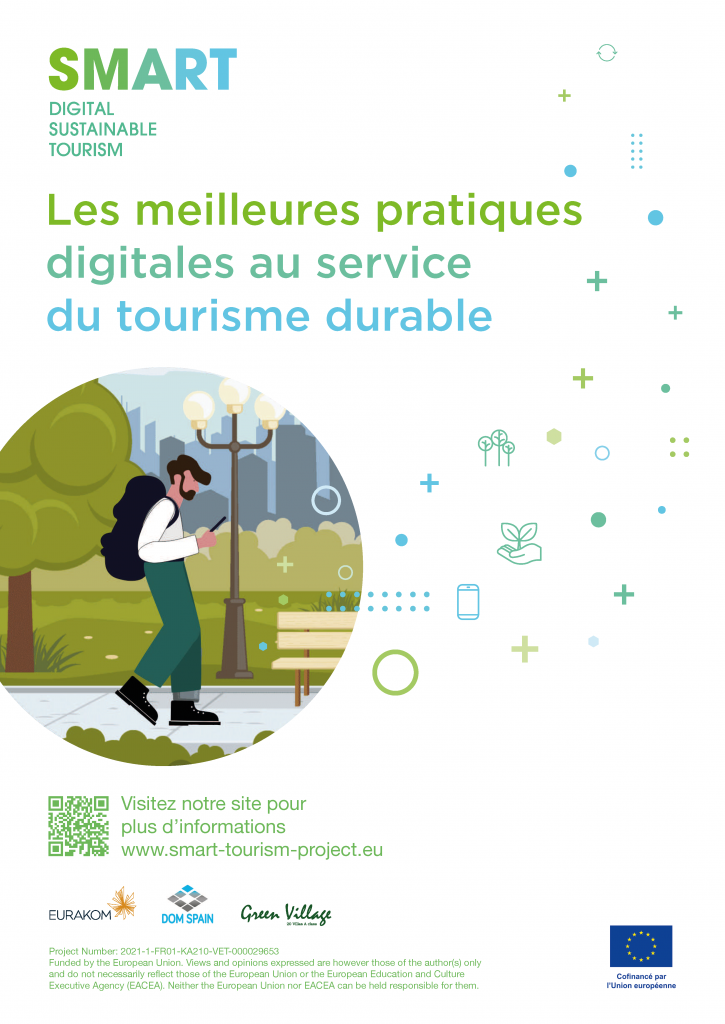The SMART project aims at supporting organisational capacity building, resilience, and safe experiences for the sustainable tourism industry through the use of digital tools and the promotion of digital skills, interconnectivity, and interoperability. SMART is the response to a real need for more materials that professionals require to adapt to a new labour market through transversal skills and competencies. SMART aims to support destinations wanting to develop a smarter and more sustainable tourism offer and who want to become more resilient. As a result, SMART aims to contribute to sustainable post-COVID-19 recovery for tourism professionals and their destinations.
The profile analysis of tourism in France provides insight into how to address current challenges around the sector’s double transition (sustainable and digital).
For more than 30 years, France has been the world’s leading tourist destination. In 2019, 90 million foreign tourists came to discover the richness of the country’s natural and architectural heritage, and enjoy a world-renowned art of living and hospitality. In France, the tourism sector represents 8% of national wealth.
The COVID-19 pandemic has had direct consequences on the tourism sector all over the world and in particular in France. At the beginning of March 2020, the epidemic led to a 40% drop in activity in the tourism sector, reaching a drop of 90% in April 2020.
After the Covid-19 crisis, the French President announced a plan for the recovery and transformation of tourism. The Government wishes to make France the leading destination for sustainable tourism in 2030 and the number one cycling tourist destination and to accomplish its objectives they introduced a 3 billion euro investment plan. In addition, the government announced a plan dedicated to supporting mountain territories towards more diversified and more sustainable tourism. These initiatives will contribute to develop transport infrastructure and encourage innovation and digitalisation but will also help improve training for people working in tourism.
Digital technology is at the origin of both new innovative tourism products and better competitiveness for companies in the sector, in particular VSEs-SMEs, and for tourist destinations. If the Covid-19 crisis has accelerated the digitalisation of VSEs and SMEs in the sector, the difficulty of access to financing for them has only increased and the gap between SMEs and bigger companies of the sector widened. Thus, the government’s plan makes the digital tool and innovation vectors for a greater tourist attractiveness of France in line with the imperatives of sustainability with a fluid and quality experience for visitors and better promotion of territories and destinations. This presupposes the specific support of an ecosystem of innovative companies dedicated to tourism activities, able to shine internationally, but also support for the digital transformation of VSEs and SMEs in the sector.
In France the digitalisation in tourism is primarily driven by bigger operators who are equipping themselves with digital tools to restore consumer confidence after the Covid-19 pandemic. SMEs and micro-businesses, which make up a large portion of tourism businesses, have limited skills and capacity to keep the pace of larger businesses such as hotel chains for example. In general, smaller businesses rely more on external platforms and intermediaries to market their offer. Developing skills and digital solutions to enable direct sales of SMEs to consumers can support the sector to become more resilient to outside influences. SMEs are also not fully aware of the value and benefits that digital tools can offer. In addition, limited access to financial support and funding for SMEs who have seen their business contract as a result of the Covid-19 crisis, makes it harder for them to keep up with larger enterprises. The Covid-19 pandemic has given digitalisation an important push into the right direction, but a lot more needs to be done to support SMEs in developing the digitalisation of their activities.
Digital tools are particularly interesting in view of catering to growing customer demands for more personalised tourism experiences in France, which can also help providers to stand out of the crowd. In view of this, tourism professionals are increasingly engaging in the development of different mobile applications for specific tourism offers. Platforms are being developed to find collaborative solutions and regroup offers in a single marketplace, which can also bring financial and very practical benefits for both provider and customer. In general, professionals believe that supporting digitalisation should lead to an overall improved customer experience, rather than necessarily replacing existing experiences with new ones.
Overall, in France and certainly also in other partner and European countries it will be essential for tourism professionals to stay up to date about developments regarding digitalisation in combination with understanding the latest tourism trends and customer expectations to ensure a successful roll-out of digital tools.
